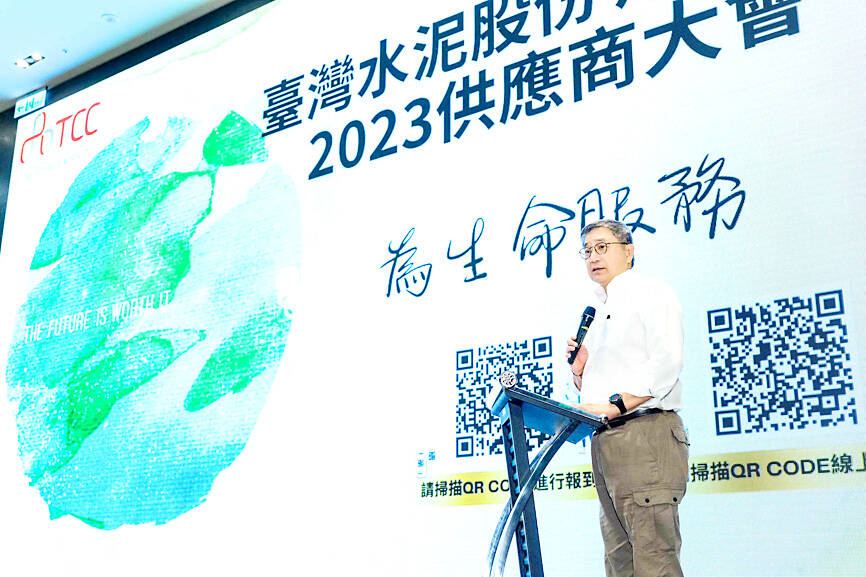Taiwan Cement Corp (台灣水泥) plans to spend up to 770 million euros (US$843.5 million) to boost its holdings in two cement ventures in Turkey and Portugal as demand for low-carbon emissions cement rises in Europe, the company said on Monday.
Taiwan Cement’s board of directors has approved a plan to lift the company’s stake in OYAK Denizli Cimento, a joint venture with Turkey’s OYAK Group, to 60 percent from 40 percent and to increase its stake in Cimpor Portugal Holdings SGPS SA, a Portuguese cement joint venture with OYAK, to 100 percent from 40 percent, it said in a statement.
“Through increased investments in OYAK Denizli Cimento and Cimpor Portugal, Taiwan Cement chairman Nelson Chang (張安平) believes the company is set to become one of the very few low-carbon emissions cement suppliers,” company spokeswoman and chief sustainability officer Shelly Yeh (葉毓君) told a midnight news conference.

Photo courtesy of Taiwan Cement Corp via CNA
The EU taxes cement and some imports of goods produced with high carbon emissions, so low-carbon emissions cement would enjoy a competitive edge over traditional cement, Yeh said.
OYAK Denizli Cimento is the biggest cement supplier in Turkey. It operates seven plants and has a 16 percent market share in the nation.
Lisbon-based Cimpor has a 55 percent market share in Portugal and has operations in Ivory Coast and Cameroon.
Taiwan Cement said it expects to complete the transactions by the end of the first quarter next year.
The company has continued to expand the revenue contribution of low-carbon emissions cement, with such products accounting for 42 percent of its revenue of NT$62.5 billion (US$1.99 billion) in the first half of this year compared with 34 percent in the same period in 2021, company data showed.
Revenue contribution from ordinary Portland cement dropped to 28 percent from 51 percent over the same period, the data showed.
Taiwan Cement said it has a target to reduce cement revenue contribution to 50 percent by 2025 from 85 percent in 2021, with half of its revenue to be from green energy solutions such as batteries and electric vehicle chargers as it transforms from a traditional cement maker into a green-energy service provider.

NEW IDENTITY: Known for its software, India has expanded into hardware, with its semiconductor industry growing from US$38bn in 2023 to US$45bn to US$50bn India on Saturday inaugurated its first semiconductor assembly and test facility, a milestone in the government’s push to reduce dependence on foreign chipmakers and stake a claim in a sector dominated by China. Indian Prime Minister Narendra Modi opened US firm Micron Technology Inc’s semiconductor assembly, test and packaging unit in his home state of Gujarat, hailing the “dawn of a new era” for India’s technology ambitions. “When young Indians look back in the future, they will see this decade as the turning point in our tech future,” Modi told the event, which was broadcast on his YouTube channel. The plant would convert

‘SEISMIC SHIFT’: The researcher forecast there would be about 1.1 billion mobile shipments this year, down from 1.26 billion the prior year and erasing years of gains The global smartphone market is expected to contract 12.9 percent this year due to the unprecedented memorychip shortage, marking “a crisis like no other,” researcher International Data Corp (IDC) said. The new forecast, a dramatic revision down from earlier estimates, gives the latest accounting of the ongoing memory crunch that is affecting every corner of the electronics industry. The demand for advanced memory to power artificial intelligence (AI) tasks has drained global supply until well into next year and jeopardizes the business model of many smartphone makers. IDC forecast about 1.1 billion mobile shipments this year, down from 1.26 billion the prior

People stand in a Pokemon store in Tokyo on Thursday. One of the world highest-grossing franchises is celebrated its 30th anniversary yesterday.

Zimbabwe’s ban on raw lithium exports is forcing Chinese miners to rethink their strategy, speeding up plans to process the metal locally instead of shipping it to China’s vast rechargeable battery industry. The country is Africa’s largest lithium producer and has one of the world’s largest reserves, according to the US Geological Survey (USGS). Zimbabwe already banned the export of lithium ore in 2022 and last year announced it would halt exports of lithium concentrates from January next year. However, on Wednesday it imposed the ban with immediate effect, leaving unclear what the lithium mining sector would do in the